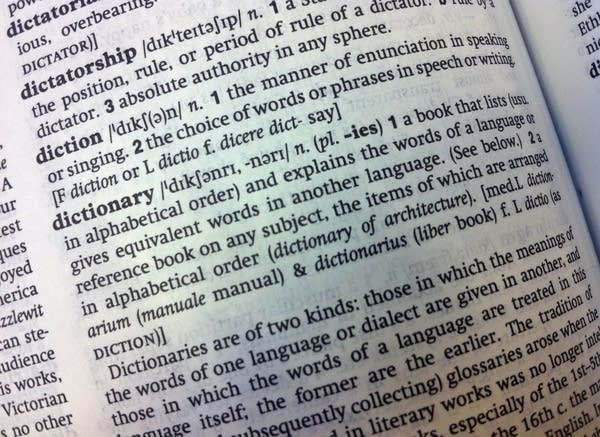Clusters of moist scabs, and other words people hate
Go Deeper.
Create an account or log in to save stories.
Like this?
Thanks for liking this story! We have added it to a list of your favorite stories.

Our show on word aversion produced a plethora ... um, cluster ... make that a good number of responses from listeners. Some of them even shared phrases composed of words they cannot bear to hear:
"Crispy curly noodle-cake, mulching in the gully."
"The nurse was dabbing the weeping sore."
So here's an idea: What's the grossest sentence you can craft from the lexicon below, or from the comments at the bottom of this page?
Turn Up Your Support
MPR News helps you turn down the noise and build shared understanding. Turn up your support for this public resource and keep trusted journalism accessible to all.
An example might be:
I rode the funicular to the fecund clematis patch.
Or:
Use the leeches from my flesh to lubricate my luggage.
Or:
My nostrils flapped at the moist manure.
Leave your suggestions in the comments below, and add any words of your own.
OFFENSIVE WORDS, AS LISTED BY OUR GUESTS AND LISTENERS:
Aficionado
Attenuate
Boil
Bois de Boulogne
Bucolic
Catheter
Clammy
Clematis
Cluster
Crisp
Cul-de-sac
Cusp
Fecund
Fiduciary
Flap
Flesh
Flocculate
Funicular
Growth
Handy
Lapel
Leeches
Lubricate
Luggage
Malignant
Manure
Moist
Moisten
Munch
Mushy
Nostril
Ointment
Onomatopoeia
Panties
Plethora
Raw
Reckon (if spoken with a British accent)
Rock star
Salad
Sassy
Scab
Slacks
Slather
Slit
Sparge
Succulent
Suctioning
Supper
Swab
Trousers
Turgid
Wedlock
Weeping
Ya'll
LEARN MORE ABOUT WORDS PEOPLE HATE:
• Why Do We Hate Certain Words?
The phenomenon of word aversion — seemingly pedestrian, inoffensive words driving some people up the wall — has garnered increasing attention over the past decade or so. In a recent post on Language Log, University of Pennsylvania linguistics professor Mark Liberman defined the concept as "a feeling of intense, irrational distaste for the sound or sight of a particular word or phrase, not because its use is regarded as etymologically or logically or grammatically wrong, nor because it's felt to be over-used or redundant or trendy or non-standard, but simply because the word itself somehow feels unpleasant or even disgusting." (Slate.com)



